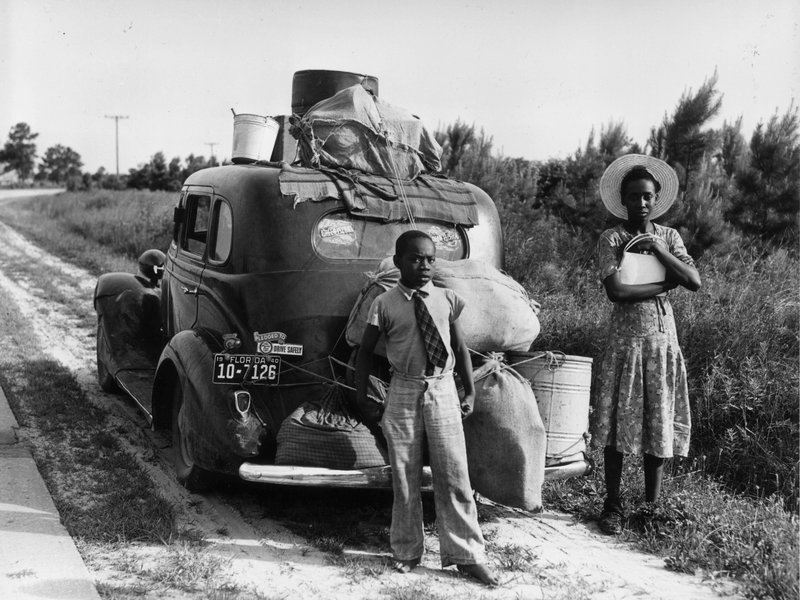Recently I commented on how far we’ve come regarding women’s suffrage. I’ve just found another reminder in a different area.
The September, 2016 issue of Smithsonian magazine is devoted to African-American history and culture. One of the issue’s most fascinating articles is “The Long-Lasting Legacy of The Great Migration” by Isabel Wilkerson , when blacks fled the South for other parts of the country. You probably remember it as a couple of paragraphs in a history book, but it really did have a huge impact on the country. When it began, 90 percent of all African-Americans were living in the South. By the time it was over, 47 percent of all African-Americans were living in the North and West. Of course, losing so much of their labor force didn’t go over well in the southern states; it was not unusual to have black families arrested for vagrancy while waiting for their train… or simply have their tickets torn up. But their loss was the rest of the country’s gain. The list of black leaders who came out of that migration is amazing (the magazine gives details).
Isabel Wilkerson , when blacks fled the South for other parts of the country. You probably remember it as a couple of paragraphs in a history book, but it really did have a huge impact on the country. When it began, 90 percent of all African-Americans were living in the South. By the time it was over, 47 percent of all African-Americans were living in the North and West. Of course, losing so much of their labor force didn’t go over well in the southern states; it was not unusual to have black families arrested for vagrancy while waiting for their train… or simply have their tickets torn up. But their loss was the rest of the country’s gain. The list of black leaders who came out of that migration is amazing (the magazine gives details).
One story in particular impressed me, and I’m shamelessly copying it here. I hope you enjoy it as much as I did. The entire article is accessible at http://www.smithsonianmag.com/history/long-lasting-legacy-great-migration-180960118/. The photo is from the article.
A little boy boarded a northbound train with his grandmother and extended family, along with their upright piano and the rest of their worldly possessions, stuffed inside wooden crates, to begin their journey out of Mississippi. It was 1935. They were packed into the Jim Crow car, which, by custom, was at the front of the train, the first to absorb the impact in the event of a collision. They would not be permitted into the dining car, so they carried fried chicken and boiled eggs to tide them over for the journey.
The little boy was 4 years old and anxious. He’d overheard the grown-ups talking about leaving their farm in Arkabutla, to start over up north. He heard them say they might leave him with his father’s people, whom he didn’t know. In the end they took him along. The near abandonment haunted him. He missed his mother, who would not be joining them on this journey; she was away trying to make a stable life for herself after the breakup with his father. He did not know when he would see her again.
His grandfather had preceded them north. He was a hardworking, serious man who kept the indignities he suffered under Jim Crow to himself. In Mississippi, he had not dared stand up to some white children who broke the family’s wagon. He told the little boy that as black people, they had no say in that world. “There were things they could do that we couldn’t,” the boy would say of the white children when he was a grown man with gray hair and a son of his own.
The grandfather was so determined to get his family out of the South that he bought a plot of land sight unseen in a place called Michigan. On the trip north, the little boy and his cousins and uncles and aunts (who were children themselves) did not quite know what Michigan was, so they made a ditty out of it and sang it as they waited for the train. “Meatskin! Meatskin! We’re going to Meatskin!”
They landed on freer soil, but between the fears of abandonment and the trauma of being uprooted from his mother, the little boy arrived with a stutter. He began to speak less and less. At Sunday school, the children bellowed with laughter whenever he tried. So instead, he talked to the hogs and cows and chickens on the farm, who, he said years later, “don’t care how you sound.”
The little boy went mute for eight years. He wrote down the answers to questions he was asked, fearing even to introduce himself to strangers, until a high school English teacher coaxed him out of his silence by having him read poetry aloud to the class. That boy was James Earl Jones. He would go on to the University of Michigan, where he abandoned pre-med for theater. Later he would play King Lear in Central Park and Othello on Broadway, win Tony Awards for his performances in Fences and in The Great White Hope and star in films like Dr. Strangelove, Roots, Field of Dreams and Coming to America.
The voice that fell silent for so long would become among the most iconic of our time—the voice of Darth Vader in Star Wars, of Mufasa in The Lion King, the voice of CNN. Jones lost his voice, and found it, because of the Great Migration. “It was responsible for all that I am grateful for in my life,” he told me in a recent interview in New York. “We were reaching for our gold mines, our freedom.”
